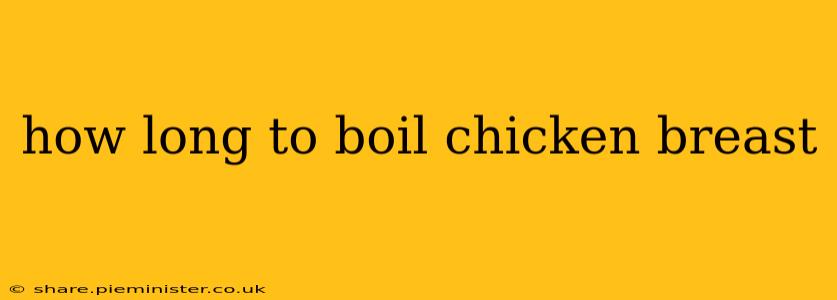Boiling chicken breast is a simple and healthy cooking method, perfect for salads, soups, or as a base for other dishes. However, overcooking can result in dry, tough meat, while undercooking poses food safety risks. This guide will help you achieve perfectly cooked, juicy chicken breast every time, answering all your boiling questions.
How Long Does It Take to Boil Chicken Breast?
The cooking time for boiling chicken breast depends on the thickness of the breast and the desired doneness. Generally, it takes 12-15 minutes to boil a 1-inch thick chicken breast until it's cooked through. However, it's crucial to use a meat thermometer to ensure the internal temperature reaches a safe 165°F (74°C). Thicker breasts will require slightly longer cooking times, while thinner ones will cook faster.
What's the Best Way to Boil Chicken Breast?
Here's a step-by-step guide to boiling chicken breast for optimal results:
-
Prepare the chicken: Rinse the chicken breast under cold water and pat it dry with paper towels. This helps to remove any excess moisture and ensures even cooking.
-
Bring water to a boil: Fill a pot with enough water to completely submerge the chicken breast. Bring the water to a rolling boil over high heat.
-
Add the chicken: Gently place the chicken breast in the boiling water. Reduce the heat to a simmer to prevent the water from boiling too vigorously and potentially tearing the chicken.
-
Simmer: Simmer the chicken breast for the appropriate time, ensuring it's completely submerged. For a 1-inch thick breast, simmer for 12-15 minutes. Use a meat thermometer to check for doneness.
-
Check the temperature: The chicken is cooked through when the internal temperature reaches 165°F (74°C) in the thickest part.
-
Remove and cool: Once cooked, carefully remove the chicken breast from the water using tongs or a slotted spoon. Allow it to cool slightly before slicing or shredding.
How Can I Tell If My Chicken Breast Is Cooked Through?
The best way to ensure your chicken is cooked through is to use a food thermometer. Insert the thermometer into the thickest part of the breast; it should register 165°F (74°C). Avoid relying solely on visual cues, as the color change isn't always a reliable indicator of doneness.
Can I Boil Chicken Breast Ahead of Time?
Yes, you can absolutely boil chicken breast ahead of time. Once cooked and cooled, store it in an airtight container in the refrigerator for up to 4 days. This is a great way to prepare ingredients for meal prepping or quick lunches.
What Are Some Ways to Use Boiled Chicken Breast?
Boiled chicken breast is incredibly versatile. You can use it in:
- Salads: Shredded or diced chicken breast adds protein and flavor to any salad.
- Soups and stews: Boiled chicken adds a delicate flavor and tender texture to soups and stews.
- Sandwiches and wraps: Sliced or shredded chicken makes a healthy and filling addition to sandwiches and wraps.
- Chicken salad: Combine shredded chicken with mayonnaise, celery, and seasonings for a classic chicken salad.
- Tacos and burritos: Shredded chicken is a great filling for tacos and burritos.
What Happens If I Overboil Chicken Breast?
Overboiling chicken breast results in dry, tough, and stringy meat. The longer it simmers beyond the recommended time, the more moisture it loses, leading to an unpleasant texture. Always use a meat thermometer to avoid overcooking.
What Happens If I Underboil Chicken Breast?
Underboiling chicken breast poses a significant food safety risk. Undercooked chicken can harbor harmful bacteria that can cause food poisoning. Always ensure the internal temperature reaches 165°F (74°C) to eliminate any bacteria.
This comprehensive guide should provide you with everything you need to know about boiling chicken breast perfectly. Remember to always prioritize food safety and use a meat thermometer to ensure your chicken is cooked to the proper temperature. Enjoy!
